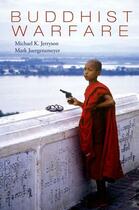Résumé:
Though traditionally regarded as a peaceful religion, Buddhism has a dark side. On multiple occasions over the past fifteen centuries, Buddhist leaders have sanctioned violence, and even war. The eight essays in this book focus on a variety of Buddhist traditions, from antiquity to the present,... Voir plus
Though traditionally regarded as a peaceful religion, Buddhism has a dark side. On multiple occasions over the past fifteen centuries, Buddhist leaders have sanctioned violence, and even war. The eight essays in this book focus on a variety of Buddhist traditions, from antiquity to the present, and show that Buddhist organizations have used religious images and rhetoric to support military conquest throughout history.
Buddhist soldiers in sixth century China were given the illustrious status of Bodhisattva after killing their adversaries. In seventeenth century Tibet, the Fifth Dalai Lama endorsed a Mongol ruler's killing of his rivals. And in modern-day Thailand, Buddhist soldiers carry out their duties undercover, as fully ordained monks armed with guns.
Buddhist Warfare demonstrates that the discourse on religion and violence, usually applied to Judaism, Islam, and Christianity, can no longer exclude Buddhist traditions. The book examines Buddhist military action in Tibet, China, Korea, Japan, Mongolia, Sri Lanka, and Thailand, and shows that even the most unlikely and allegedly pacifist religious traditions are susceptible to the violent tendencies of man.
Donner votre avis
















